Building a Colocation Strategy to Take on AI
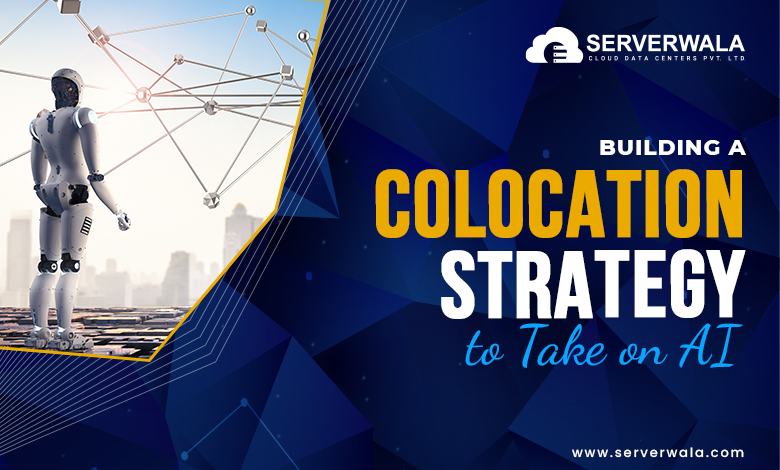
Introduction
Artificial Intelligence (AI) is reconfiguring industries by revolutionizing processes and driving creativity. From automating routine activities to intensifying complicated decision-making, AI is redefining how businesses operate. It is no longer a futuristic concept. AI is a requirement for staying at the forefront of the existing digital age.
However, adopting AI is not without challenges. AI workloads demand immense computational power, significant storage capacity, and ultra-low-latency networking. These requirements often exceed the capabilities of traditional IT infrastructures. Building an in-house facility to meet these needs involves substantial financial investment and ongoing operational complexities.
This blog explores how colocation can address these challenges efficiently. Colocation involves utilizing third-party data centers to house your IT infrastructure. It offers scalable, cost-effective solutions while eliminating the operational burdens of private data centers. For enterprises eyeing AI initiatives, colocation provides the robust infrastructure needed to support high-performance computing, ensure reliability, and accelerate AI-driven transformations.
What is Artificial Intelligence?
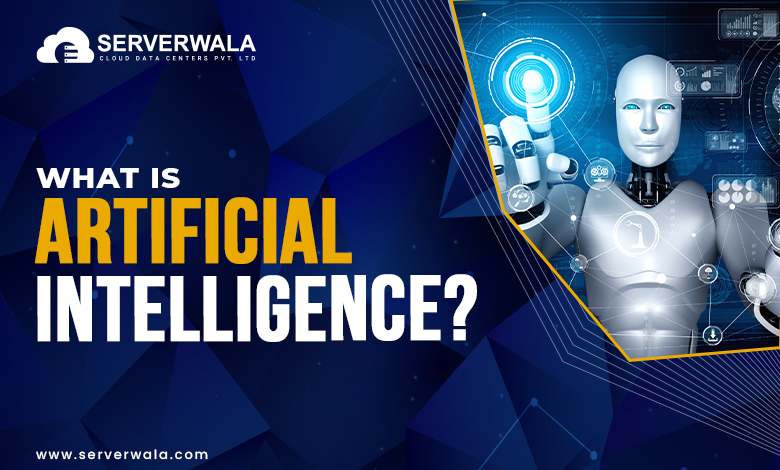
Artificial Intelligence (AI) involves developing computer systems that do operations generally wanting human intelligence. These operations incorporate learning from data, reasoning via complicated issues, decision-making, and understanding natural language. AI aims to simulate human cognitive functions but at a speed & scale that humans are not able to achieve.
The core of AI includes various subfields such as:
- Machine Learning (ML): Machines are trained to learn from data. With time, they adapt as well as enhance their functioning without explicit programming.
- Deep Learning: This subfield uses complex neural networks with multiple layers, mimicking the brain’s architecture. Deep learning has revolutionized fields such as picture identification, NLP, & autonomous driving.
- Natural Language Processing (NLP): AI systems are capable of understanding and generating human language, permitting activities like sentiment examination, chatbots, and voice assistants.
- Reinforcement Learning: AI agents learn by engaging with their platform, taking action, and acquiring feedback to intensify their performance over time.
The objective of AI is to automate tasks as well as create intelligent systems that function autonomously. These systems parallelly learn from new data, enabling them to evolve and make smarter decisions.
Preparing Your Enterprise for an AI-Enabled Future
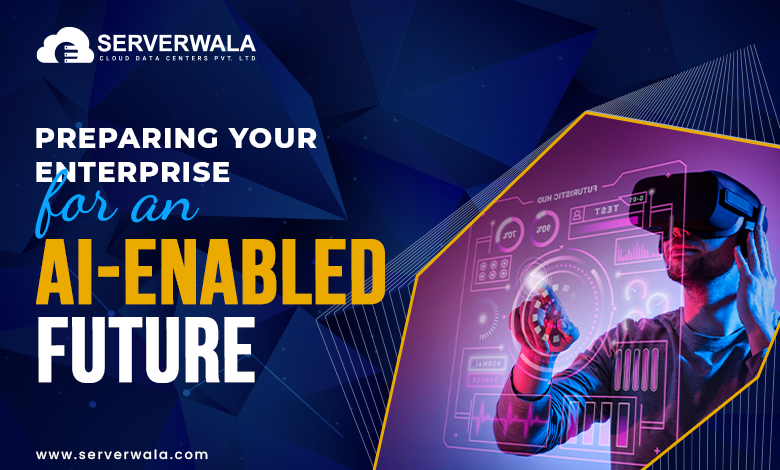
Integrating AI into your business is a strategic move, but it requires careful planning. The first step is to assess your current IT infrastructure to ensure it can support the massive data processing and storage needs of AI workloads.
Take into consideration the following steps to prepare for AI adoption:
- Evaluate Data Storage Needs: AI applications construct & consume huge volumes of data. Guarantee that your infrastructure is able to administer the data influx. You may require to invest in scalable cloud storage or high-capacity on-premise solutions.
- Upgrade Computing Resources: AI workloads, particularly machine learning and deep learning, require powerful computing hardware. High-performance computing resources are essential for training complex AI models.
- Execute Powerful Data Management Strategies: Effective data management is crucial for AI success. Guarantee your data is clean, organized, and available. Data quality directly influences the precision as well as the effectiveness of AI models.
- Plan for Scalability: As AI capabilities expand, your infrastructure must scale. Assure that your systems can take care of larger data loads, processing power, and networking requirements. Colocation services provide flexible scalability without the necessity for huge capital investment.
- Prepare for Energy Demands: AI models, especially deep learning networks, require substantial computational power, which in turn generates significant heat. Ensure your infrastructure is equipped with adequate cooling systems to sustain optimal performance.
- Ensure Low-Latency Networks: AI applications, especially real-time ones, require low-latency connectivity for instant data processing and decision-making. Network architecture must support these high-speed, high-volume transactions.
The colocation approach is particularly useful for AI adoption. By housing your infrastructure in a third-party facility, you gain access to high-performance computing resources, efficient cooling, and redundant power supply without the financial and operational burden of maintaining an in-house data center. This approach is designed to support the power, cooling, and connectivity needs critical for AI workloads.
How Colocation is Helping in Revolutionising the Digital Experience?
The Data Center’s Role in Supporting AI
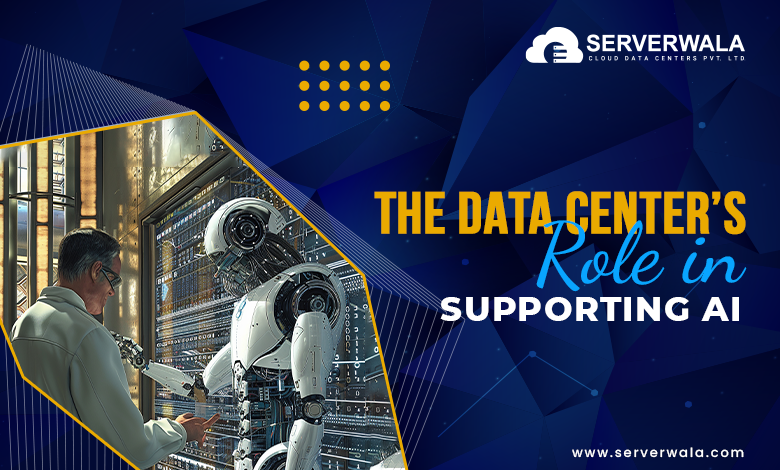
Data centers are essential for supporting AI operations by providing the infrastructure required to power AI workloads. AI demands substantial computing power, massive storage, and efficient connectivity—all of which are facilitated by modern data centers. These facilities act as the backbone for AI technologies, housing powerful hardware, ensuring optimal performance, and enabling seamless operations across industries.
Let’s dig deep in how data centers, like Serverwala, support AI applications:
- Housing High-Performance Hardware: AI workloads rely on proficient hardware, including Graphics Processing Units & Tensor Processing Units. These processors are built to handle the parallel processing needed for tasks like machine learning model training. Data centers provide the necessary environment to house these high-performance machines. We at Serverwala Cloud Data Centers ensure that our data centers are equipped with the latest hardware and state-of-the-art facilities to meet the growing demands of AI technologies.
- Scalable Infrastructure for Growing AI Needs: AI adoption is rapidly expanding, with businesses continually exploring new applications. As AI workloads intensify in size as well as complexity, scaling up infrastructure becomes crucial. Thus, Serverwala offers scalable space, ensuring that businesses can expand their infrastructure as their AI needs evolve. Whether it’s adding more servers or upgrading storage, these facilities provide the flexibility needed to grow with AI advancements.
- High-Density Power Solutions: Running energy-intensive AI hardware requires stable, high-density power. These systems draw considerable energy, which makes it essential for data centers to provide robust power solutions. Serverwala’s data centers offer high-density power to support AI’s power-hungry equipment, ensuring that operations remain smooth without interruptions. Redundant power systems are also in place, guaranteeing that AI applications continue running even in case of power failure.
- Efficient Cooling Systems: AI hardware generates immense heat, especially during intensive tasks like training deep learning models. Without proper cooling, systems may overheat, resulting in lessened functioning or failure. Data centers, like ours, implement advanced cooling technologies to manage this heat load. These systems, including liquid cooling and efficient airflow management, ensure optimal temperature regulation, protecting sensitive AI hardware and maintaining its efficiency.
- Low-Latency Connectivity for Real-Time Processing: AI applications frequently need real-time data processing. Whether it’s autonomous vehicles, real-time analytics, or live decision-making systems, low-latency connectivity is critical. Serverwala’s data centers are strategically located to provide access to multiple network providers, ensuring direct and high-speed connections to global networks. This low-latency environment is essential for AI applications that require to operate data in real-time and make immediate decisions.
- Security and Reliability for AI Workloads: AI data is sensitive, and ensuring its security is a top priority. Data centers must protect against data breaches, unauthorized access, and other threats. Serverwala leads in this area as well by providing robust security measures, incorporating 24/7 surveillance, biometric access controls, & multi-layered firewalls. These measures safeguard your AI data and ensure continuous reliability, making it an ideal partner for businesses looking to adopt AI technologies.
The AI-Ready Data Center
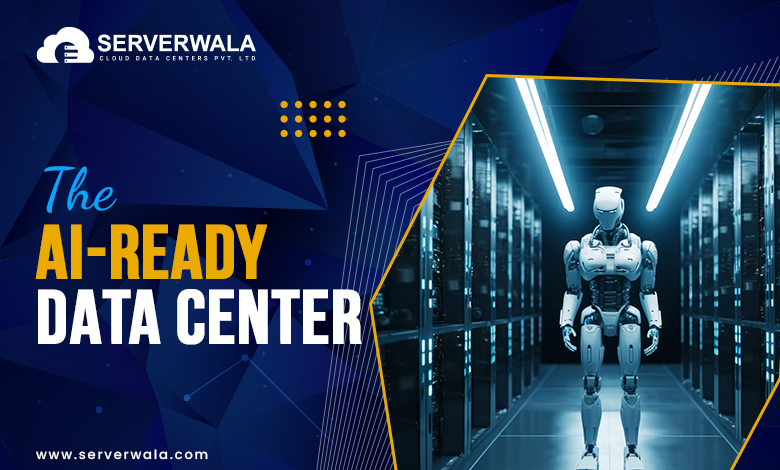
An AI-ready data center is equipped to meet the specific needs of artificial intelligence workloads, which are more demanding than traditional computing tasks. Here are the essential features that define an AI-ready data center:
- Scalable Space: AI applications construct huge volumes of data that need to be operated and kept. As AI workloads grow, the data center must offer scalable space to accommodate expanding infrastructure. Flexible configurations are essential for housing high-density racks and high-performance computing systems, which can grow alongside the increasing demands of AI technologies.
- High-Density Power: AI workloads, particularly those using GPUs and TPUs for machine learning and deep learning, require substantial power. An AI-ready data center must have high-density power availability to support these energy-intensive hardware components. Ensuring reliable and efficient power is crucial to maintain the operation of AI systems, particularly during peak computational loads.
- Advanced Cooling Systems: AI hardware generates significant heat, and overheating can cause system failure or reduce performance. Effective cooling systems, such as liquid cooling and high-efficiency air conditioning, are essential in AI-ready data centers to maintain optimal temperature levels and avoid equipment damage. These cooling systems also help optimize energy usage to keep operational pricing under administration.
- Low-Latency Connectivity: Real-time data processing is a crucial necessity for several AI apps, such as autonomous vehicles or financial trading platforms. AI systems need low-latency, high-speed connectivity to enable immediate data transfers between storage and compute resources. A data center that offers robust and redundant network connections ensures that AI workloads can be processed without delays, improving overall performance and responsiveness.
- Security: AI models often involve handling sensitive data, making data security a foremost priority. AI-ready data centers must implement strong physical and cybersecurity measures to safeguard this data. This incorporates biometric access control, video surveillance, encryption, firewalls, and intrusion recognition systems to prevent malicious accessibility and protect against data breaches.
- Flexibility and Customization: AI applications vary widely in terms of hardware as well as software necessities. An AI-ready data center must be adaptable to meet the changing needs of AI workloads. This includes supporting different types of AI hardware, such as specialized processors or storage systems, and enabling customization of infrastructure to suit specific project needs.
Also Read: How Colocation Data Centers Are Essential for Your Business Growth?
Conclusion
A well-planned colocation strategy offers a solid foundation for embracing AI technologies. It ensures enterprises have access to scalable space, high-density power, and advanced cooling systems tailored to AI workloads. These facilities also provide unparalleled connectivity, essential for real-time AI processing and data exchanges.
By choosing colocation, businesses can avoid the high costs and complexities of building and managing private data centers. Instead, they can focus on refining AI applications and unlocking new opportunities in their industries.
Colocation not only supports the technical requirements of AI but also fosters innovation by enabling quicker deployment and scaling of AI solutions. With the right colocation partner, your enterprise can confidently navigate the complexities of AI adoption, seize new opportunities, and secure a competitive edge in an AI-driven future.





